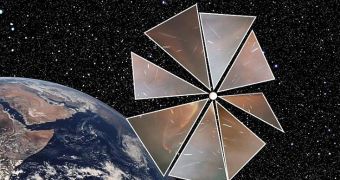Since the advent of the Space Age, countless satellite and rocket launches have made their way to orbit, either to be used later on, or as test vehicles. As rockets continue to take off, the space above us is constantly getting more crowded, with shards of metal flying at incredibly high speeds along their respective orbits. There are hundreds of thousands of them, and some are too small to even keep track of. Specialized stations around the globe dedicate their resources to looking out for these objects. But now, their workload may be reduced by a new instrument, designed to clean orbital debris.
Scientists in the United Kingdom are currently working on perfecting a small device, no larger than 30 centimeters at its longest point, that could in the future be used to remove aging or spent satellites and other pieces of debris from Earth's orbit. The small instrument, called “CubeSail,” will be demonstrated for the first time in 2011, the team hopes. Its basic operating principle is fairly straightforward. The machine deploys a small sheet of plastic, no larger than 25 square meters, which it then uses to propel itself, or anything it's attached to, at higher speeds than normal, after it exits the atmosphere.
The sheet will be “powered” by residual air molecules, which astronomers know still exist in low-Earth orbit. This would inflate the sail, and push both the CubeSail and the object it's attached to out of orbit, decreasing the risks of potentially catastrophic collisions. The team that developed the new concept, based at the Surrey Space Center, says that an adaptation of their satellite could be envisioned as being able to rendezvous with satellites already in orbit, dock to them, and then remove them from orbit. This approach will most likely not be able to deal with the myriad of small metal shards, some smaller than 1 inch in length, but it will eliminate the largest, most massive threats, the BBC News reports.
“Our system is simple and very low cost; but we need to demonstrate that it can be done. It would help make space a sustainable business. We want to be able to keep on launching satellites to provide new services; but unless we do something, the amount of junk up there is going to grow exponentially,” explains SSC senior lecturer in space vehicle control, Dr. Vaios Lappas. He is also the lead project researcher for the new initiative. The prototype for the CubeSail was unveiled yesterday, and experts say it has a weight of just 3 kilograms.

 14 DAY TRIAL //
14 DAY TRIAL //